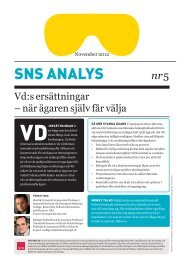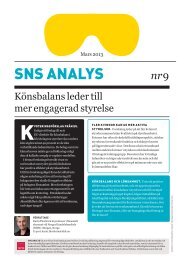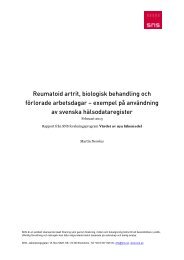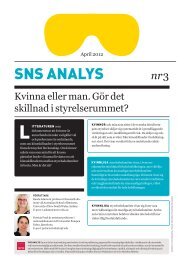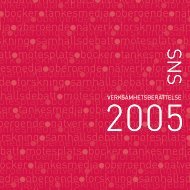Billie Pettersson and Frank R. Lichtenberg - SNS
Billie Pettersson and Frank R. Lichtenberg - SNS
Billie Pettersson and Frank R. Lichtenberg - SNS
You also want an ePaper? Increase the reach of your titles
YUMPU automatically turns print PDFs into web optimized ePapers that Google loves.
Executive SummaryLife expectancy around the world has increased dramatically over the past fifty years,while at the same time health care spending has risen substantially. Historically it hasbeen difficult to quantify the relationship between health care spending <strong>and</strong>improvements in longevity.We conducted a study to assess the contribution of oneindicator of changes in health care, the introduction of new drugs, to increasedlongevity. New drug launches are of particular interest because they account for asubstantial fraction of medical innovations.We used longitudinal, disease-level data to analyze the impact of pharmaceuticalinnovation on longevity <strong>and</strong> medical expenditure in Sweden during the period1997−2010. We found that diseases that benefited from more pharmaceutical innovationhad greater increases in longevity. Pharmaceutical innovation accounted for almost onethird (31.6%) of the 1.88-year increase in mean age at death during the period1997−2010. Our models included year <strong>and</strong> disease fixed effects, so they controlled forthe overall increase in Swedish longevity <strong>and</strong> for stable between-disease differences inmortality, but not for non-pharmaceutical innovation, which might cause overestimationof the effect from introduction of pharmaceuticals. However, analysis based on U.S.data showed that the rate of pharmaceutical innovation is not positively correlated withthe rate of medical procedure innovation <strong>and</strong> may be negatively correlated with the rateof diagnostic imaging innovation. This suggests that failure to control for other medicalinnovation is very unlikely to result in overestimation of the effect of pharmaceuticalinnovation on longevity growth, <strong>and</strong> may even result in underestimation of this effect.We found that longevity depends on the number of drugs (substances) to treat a disease,not the number of chemical subgroups (drug classes) developed to treat the disease.Diseases that experienced more pharmaceutical innovation saw smaller increases inhospital use. New drugs have been cost saving: the reduction in annual hospitalexpenditure induced by pharmaceutical innovation has been greater than the inducedincrease in annual pharmaceutical expenditure. New drugs have reduced lifetimemedical expenditure, despite the fact that they increased life expectancy by 6 monthsduring 2000−2009.One limitation of this study is that while it does provide information about medicines onan aggregate level, it does not indicate medicines in which to invest. Another limitationis that the outcome measure is related to longevity, which is indeed a widely usedindicator of the health of a population, but it reflects the quantity rather than quality oflife. Many medicines mainly improve quality of life <strong>and</strong> this will not be covered in ourstudy. Nevertheless, the conclusion is that new pharmaceuticals, on an aggregate level,are an important production factor in health care.The uptake <strong>and</strong> use of (new) medicines is determined by policies at several levels: at themacro or healthcare system level, the service organization level <strong>and</strong> the clinical practicelevel. During the last two decades a variety of pharmaceutical policies has beenintroduced in Sweden, which might have had an impact on the use of new medicines,but no thorough <strong>and</strong> complete review of these polices has yet been carried out. Thereare potential new pharmaceuticals that increase life expectancy <strong>and</strong>/or lead to reduceduse of other resources. It is important to prioritize so that resources could be allocated tothese products. Pharmaceutical policies should be balanced to allow society as well as7





